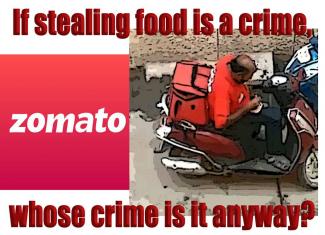
The gruelling, competitive life of food delivery agents
The system of incentives and the absence of a fixed salary creates a paradox for drivers as they often do not find time to stop and eat their meals for the day.
(Excerpted from a story by Prajwal Bhat, The News Minute, December 13, 2018)
THOUGH little is known about the lives of these drivers who deliver food to people in many cities and towns of India, a negative light was shone on the workers this week after a video showing a Zomato delivery person eating from food packets went viral. The delivery agent, who was in Madurai, was fired after the incident.
Yet, when TNM asked delivery persons about their work conditions, many said they had chosen a gruelling schedule that incentivises fewer breaks for those who want to increase their earnings.
On the ground it is evident that the system of incentives and the absence of a fixed salary creates a paradox for drivers as they often do not find time to stop and eat their meals for the day.
"I want to do more trips because that gives me money but the problem is that most times, I don't get time to stop and eat my meals. I often end up eating food from the hotel I am getting the client's food from," Zubaid says.
Zubaid then points to his legs and says, “I have had four accidents in two years, three were serious. This leg was seriously injured."
The situation is similar for drivers working with other food ordering and delivery start-ups like Uber Eats, Zomato and Foodpanda.
Mani is a driver entrepreneur with Zomato, and like Shekhar, has slowly begun increasing the number of hours he works on delivering orders for Zomato. "There is no other option to earn more money," he says.
But he believes there is a long list of problems for the company to address. He points out that the vehicles of the drivers are owned by them and the petrol charges are covered under the money they earn on each order. The company also does not bear responsibility for the repairs of the vehicle.
Although the start-ups remain embroiled in a competition to take a lion's share of the market, the calls for them to do more for their drivers are slowly growing louder.
Liberation Archive
- 2001-2010
-
2011-2020
- 2011
- 2012
- 2013
- 2014
- 2015
- 2016
- 2017
- 2018
-
2019
-
JANUARY-2019
- Oust the Fascist Modi Regime! Rescue India, Rebuild India!
- Assembly Elections 2018: A Blow To Fascist Politics
- The Elitist Reaction to the Zomato Delivery Man
- More Orders, More Money
- Why I Stole food
- Kisan Mukti March : When United Peasant Resistance Defused The Fascist Aggression
- Kisan Mukti March : The Farmers' Freedom March
- Kisan Mukti March : Civil Society and Opposition Parties Come out in Support
- MANIFESTO OF INDIAN FARMERS
- Farmers' Unity will become the Biggest Force in Fighting Fascism
- Save Our Farmers
- The Fraud of Farm Suicide Numbers
- Agrarian Crisis = Nation's Crisis
- Sinking in a Sea of Debt
- Why The Market Has Not Worked For Farmers
- Agrarian Crisis: A Crisis of Women Farmers
- Overworked, Underpaid, Unrecognised: Bihar ASHAs on Indefinite Strike
- Seminar: 'Women's Rights and Increasing Attacks on Democracy'
- Supreme Court as Custodian of the Constitution
- Comrade Vinod Mishra's Bhojpur
- Why Supreme Court Order Doesn't Amount to 'Clean Chit' to Modi Government on Rafale
- All Over The World, Home Is The Most Unsafe For Women
- FEBRUARY-2019
- MARCH-2019
- APRIL-2019
- May-2019
- LIBERATION, JUNE 2019
- Liberation JULY 2019
- LIBERATION, August 2019
- Liberation, SEPTEMBER 2019
- Liberation, OCTOBER 2019
- Liberation, NOVEMBER 2019
- Liberation, DECEMBER 2019
-
JANUARY-2019
- 2020
- 2021-2030
Charu Bhawan, U-90, Shakarpur, Delhi 110092
Phone: +91-11-42785864 | Fax:+91-11-42785864 | +91 9717274961
E-mail: info@cpiml.org







